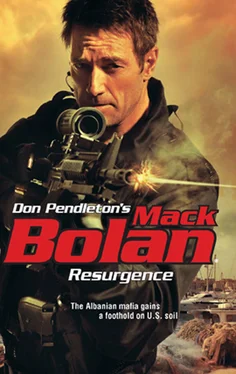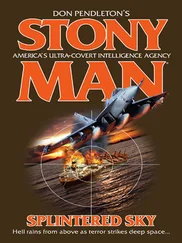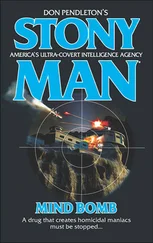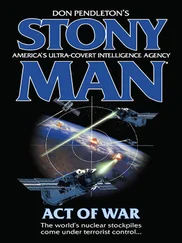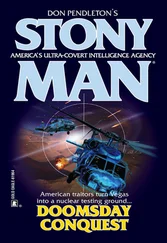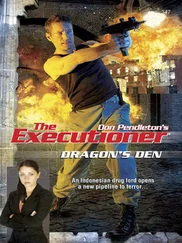And if a head had to roll, Kurti didn’t intend it to be his.
So he was driving with a dozen of his soldiers through the night, with a surprise for Cako. The man would resent it, but if he was smart he’d keep his mouth shut and accept the wisdom of his betters as his own best chance to stay alive.
Kurti was taking over.
He would charm the foreign buyers, salve their wounded feelings with whatever balm it might require. He had no end of alcohol and drugs available, and Kurti might even allow them to take turns sampling the merchandise. Enough, at least, to whet their appetites for more.
At a reduced price, certainly.
But not too much reduced.
Life was a business, after all. And so was death.
Kurti had only visited the vast Pine Barrens once before. On that occasion, two of his unruly soldiers had required a dose of special discipline. Kurti had driven them to Cako’s woodland hideaway, where no one but the members of a hand-picked audience could hear them scream.
And scream.
For hours on end.
Kurti pretended to derive no pleasure from such terminal events, because excessive lust for blood could be a weakness, just as surely as a fear of spilling any blood at all. A man should manage to control his base emotions at all times—except, perhaps, at the climactic moment of his rutting with a whore.
And even then he should be able to react effectively if threatened by an enemy, confronted by some crisis.
Anyone who lost control completely was a fool.
And easy meat for adversaries.
He was counting on a certain weakness in the men who’d flown halfway around the world to bid on human merchandise. They had been shaken up this night, endangered, and would naturally be irate. Their dignity was ruffled, even if they’d suffered no real injury.
In situations such as this, dealing with ruthless men of power, Kurti knew certain concessions had to be made. He would admit responsibility for their discomfort, to a point, and offer his assurance that the insult would be punished. He might tape that punishment, as it unfolded, and provide free copies for the personal amusement of his guests.
As for the women, they were still available. Still lovely and unsullied by the incident that had disrupted Cako’s first attempt to sell them off. Would any of the buyers choose to go home empty-handed and declare their trips a total waste?
Kurti thought not.
His thirty-year career in crime, devoted to obtaining profit from the misery of others, had taught Kurti not to miss a trick along the way. Instead of granting his unhappy guests access to any of the merchandise, he thought it might be fun to stage a little show for them. Let them observe the girls with one another.
Wait until their lust took over, and no discounts were required.
He might even increase the asking price.
Why not?
His buyers were men who lived by the rule of supply and demand.
And sometimes died by it.
It had crossed Kurti’s mind that the men who had raided Cako’s estate might follow up with a strike at the Pine Barrens site. He deemed it unlikely, but part of him hoped that it would come to pass.
That way, Kurti could avoid expensive, time-consuming searches that exposed his men to greater risks from both their unknown enemy and the authorities. He had been lucky so far, with the FBI and DEA, whose focus on Albanians had cracked the Rudaj syndicate in Queens but left the group that Kurti served intact.
That luck had been too good to last, perhaps, but Kurti meant to take advantage of it while he could.
By this time tomorrow, he hoped to have good news for Rahim Berisha at home.
And to save his own life in the process.
VOLKOVA USED a piece of motel stationery to sketch a map of Lorik Cako’s place in the Pine Barrens, giving Bolan a bird’s-eye view of the spread and its lone access road.
“You’ve flown over the place?” he inquired.
“But of course,” she answered, smiling. “Several companies advertise tours of the region. I chose Jersey Devil Airlines. Their pilot was most attentive.”
“I’m not surprised. No photos, though?”
“I did not wish to give him food for thought, yes?”
“Right. Good thinking.”
Bolan guessed that he could trust her memory, considering the fact that she was set to bet her own life on it. What the drawing didn’t offer was a head count of the staff on-site or any hint concerning Cako’s possible security precautions.
“It’s a good-size house,” he said. “And that’s a barn?”
“Apparently. Of course, it may have been converted into lodging, or for other purposes.”
Like selling kidnapped women off as slaves.
Or chopping captives into bite-size pieces for the local forest scavengers.
“It’s too bad that I lost my rental car,” Bolan observed. “I had some gear stashed in the trunk that could’ve come in handy.”
“More than this?” she asked, half smiling, as she nodded toward his carbine and assorted other hardware piled beside his chair.
“More ammunition,” Bolan said. “A sniper rifle. And an M-32 MGL.”
“The grenade launcher? Forty millimeter, I believe.”
“That’s it,” Bolan concurred.
“It would be useful. I suggest we go back for your car, after we sleep.”
He had to frown at that. “Sounds like we’re wasting time.”
“Cako will need that time to calm his customers, if they’re still with him. If they’re not, we have lost nothing.”
“Nothing but the women,” Bolan said.
“You think he will dispose of them?”
“He might.”
“Cako may be a zhopa—what you call an asshole—but he’s first a businessman. He won’t dispose of valuable merchandise without good reason. More importantly, his masters would resent it.”
“After last night, he may think he has a reason,” Bolan said.
“I doubt it. Certainly, he faces inquiries from the authorities. His house may need repairs. But who can link him to the women or even prove they exist? In his mind, I assure you—and in Arben Kurti’s mind, as well—the living women still have value. Now, if they were rescued by police and were prepared to testify…”
She didn’t have to finish it.
“Okay,” Bolan agreed. “Let’s say you’re right. I have to get it done this time. Clear out the hostages and deal with Cako, then take Kurti out before he slips away.”
“You’re an ambitious man,” Volkova said.
“I dropped the ball tonight,” Bolan replied. “Call it damage control.”
“And I will help you.”
“Won’t your people be upset?” Bolan inquired. “I don’t imagine you were sent to hunt down the Albanians this way.”
She shrugged and told him, “My superiors appreciate results. There was no realistic prospect of collaborating with your FBI toward prosecution of Kurti or Cako. I’m more likely to be charged myself, for some infringement on homeland security.”
“I take it you don’t have a diplomatic pass?”
“Only a simple tourist visa, as it happens.”
Simple tourist. Right.
“Okay. We give the other side some time to pacify their customers, then see about my car when everybody’s heading off to work. Sound fair?”
“I’ll change now,” Volkova said, “to save some time.”
He watched her take some items from a dresser drawer and disappear into the small bathroom. Ten minutes later she was back, dressed in a tight black turtleneck and matching jeans, hair tied back in a ponytail. All that she needed was some war paint to cover her peaches-and-cream complexion, but Bolan wasn’t complaining.
“You’ve come prepared,” he said.
“I do,” she told him, ducking to retrieve a duffel bag from underneath her bed. She set it on the bedspread, opened it and pulled out an AKS-74U carbine. The U stood for Ukorochenniy—“shortened,” in Russian—and the stubby piece lived up to its name. It was a standard Kalashnikov AK-74 assault rifle, truncated to fire from an 8.3-inch barrel, with a skeletal folding stock. Ammo-wise, it chambered 5.45 mm rounds with the same magazines holding thirty or forty-five cartridges, with an effective range of six hundred yards and a full-auto cyclic rate of 650 rounds per minute.
Читать дальше
